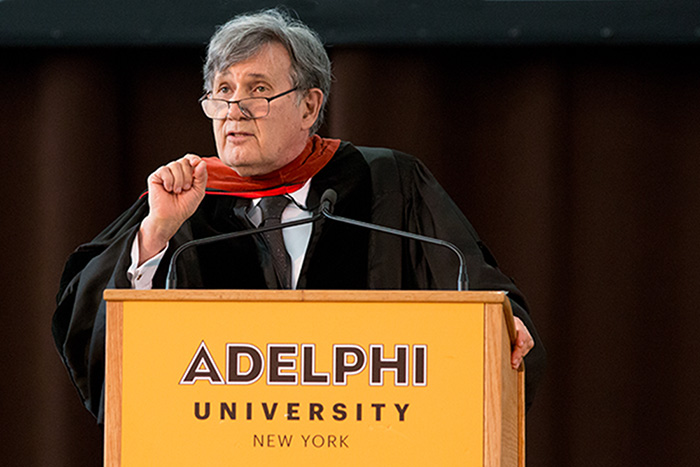
Lectures by David P. Machlis, Ph.D., associate professor of finance and economics, aren’t one-sided talks. They’re enthusiastic performances, filled with engaging give-and-take and interactive storytelling that encourage critical thinking.
“I look at every class as a teaching performance. I never sit down. If there were 100 or 200 students, I would do the same thing, but it wouldn’t have the same impact,” said Dr. Machlis, who spoke about the value of small class sizes at the Matriculation ceremony for incoming Adelphi students this past August.
His lectures are capped at 35 students, an uncharacteristically small number for most universities. He knows his students by name. In class, he runs across the room to illustrate the concept of elasticity—if a product is elastic and prices increase, people will run away from it. It may seem silly, but his antics make the concept stick.
“The very first day of the semester, I tell all my students that this is my 52nd year at the University and I have not yet learned how to lecture,” Dr. Machlis said. “And I further tell them that I won’t learn this semester, either.”
This approach earned Dr. Machlis Adelphi’s 2018 Teaching Excellence Award, for which he was nominated by 17 Robert B. Willumstad School of Business faculty members and supported by renowned Holocaust scholars and human rights activists. He has been nominated for outstanding professor many times, often by students, once with the support of Nobel laureate Elie Wiesel. As co-founder and vice chairman of the educational organization International March of the Living, Dr. Machlis has created and designed innovative programs to bring diverse communities of people to Poland to study the Holocaust.
These values of inclusivity and community also permeate his classroom. For example, Dr. Machlis gives his cell phone number to all his students and encourages them to call with any questions about the material, at any time.
“Dealing with a student’s questions regarding understanding complex material requires direct contact via cell phone rather than exchanging responses by email,” he said. “I tell students, ‘I am available at home on an unlimited basis. I look forward to hearing from you.'”
He also invites his classes to his home at the end of the semester for a course review and lunch. “I make brownies and cookies and all kinds of salads,” he said. “The students love it.”
As evidence of Dr. Machlis’ lasting impact, a former student who now teaches social studies in Great Neck South High School on Long Island still uses the notes she took in his class and even refers to his signature singing of “You can’t have one without the other!” to help students understand complementary products.
Meanwhile, Dr. Machlis still discovers new and exciting teaching ideas while running his lectures.
“I hope and pray that I can do this for many more years,” Dr. Machlis said. “I would like to have a tremendous impact on Adelphi students, and my wish is that I remain as skilled in teaching as I’ve been for the last 51 years.”

